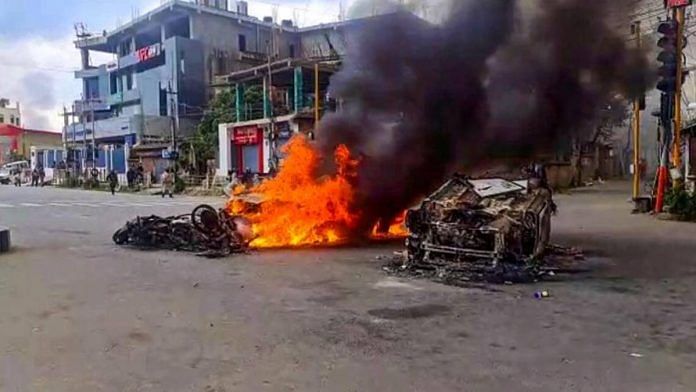New Delhi: The breakdown of law and order in Manipur is an indictment of the central government and a setback to New Delhi’s long-term strategy in the northeast, according to two scholars who have written on India’s internal security.
In the context of the ongoing violence in the northeastern state, ThePrint interviewed Amit Ahuja and Devesh Kapur, co-editors of the 2023 book Internal Security in India: Violence, Order and the State. Ahuja is an associate professor at the University of California, Santa Barbara, while Kapur is Starr Foundation professor of South Asian Studies at Johns Hopkins School of Advanced International Studies.
There’s a “classic scenario” playing out in Manipur, where the state police have been overwhelmed, leading to a breakdown in law and order and requiring the central government to intervene, said Ahuja.
“…The reason I say it’s classic is because if you think about insurgency-hit areas — for example, Kashmir, Punjab — the police were overwhelmed…the first responders who are supposed to deal with these situations are, in some ways, missing in action.”
The fact that central forces are being used “tells us what is going to happen in the long term, that this will essentially undermine state authority going forward”, he added.
He added that the state will use all instruments at its disposal to impose order. However, the lack of conversation around holding the state accountable for violence that has already occurred, failure to facilitate reconciliation among warring groups and lack of transparency will leave wounds to fester. “That is something we need to keep an eye on and think about.”
“Capacity for law and order needs to exist in the state. And we don’t need to turn to central intervention all the time.”
He also warned of the dangers of the Army, if asked to intervene, being drawn into a peacekeeping operation that could escalate into counter-insurgency.
According to Ahuja, these developments come as a setback to the gains the Indian state has made in the northeast through its long-term strategies — such as bringing people into the political process, so that “yesterday’s insurgents are today’s lawmakers”.
“The state has had a record of both talking and fighting at the same time…The N-E is a very good example of that…its Look East policy [cultivating extensive ties with Southeast Asian countries] has just not been on paper. It has built a lot of infrastructure, it has managed to bring down violence, keep the political process together — until Manipur happened.”
Also read: More than 6 weeks on, Manipur is still ablaze. It’s a saga of failures, from state govt to Centre
‘State’s duty to protect citizens’
According to Devesh Kapur, “The fundamental duty of any state is to protect its citizens against external and internal violence. Without order, you cannot have liberty and development.”
“When there is a breakdown in order, it is fundamentally the failure of the state. What is happening in Manipur is a real indictment of the central government. To allow this level of violence to fester for so long is really unconscionable,” he added.
In such times, “the state really needs to have the equivalent of the Hippocratic Oath – do no harm”.
“Above all, it’s the people of these places that pay the highest price, by far, because they are the ones who suffer the most…But the price will also be borne by the security forces, because they have to do the hard work of restoring order,” Kapur said.
(Edited by Smriti Sinha)
Also read: Manipur saw ‘free’ India’s 1st flag hoisted. Now it’s BJP’s biggest internal security challenge



